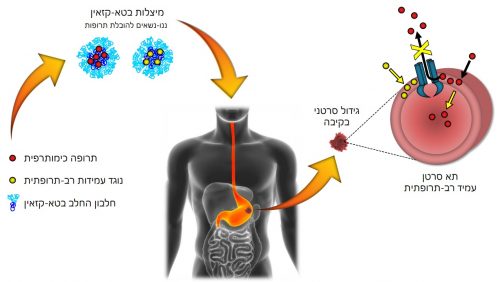The new treatment is based on a transport platform developed at the Technion and a combination of anti-cancer drugs and an anti-resistance agent, which eliminates the tumor's resistance to drugs

A study conducted at the Technion and published in the journal Oncotarget presents an innovative technology for future treatment of stomach cancer. The new treatment is based on a transport platform developed at the Technion and a combination of anti-cancer drugs and an anti-resistance agent, which eliminates the tumor's resistance to drugs. It was developed as part of Maya Bar-Zev's doctoral thesis, at the Russell Berry Institute for Nanotechnology at the Technion (RBNI) under the joint guidance of Prof. Yoav Livni from the Faculty of Biotechnology and Food Engineering and Prof. Yehuda Asraf, Dean of the Faculty of Biology and head of the Fred Vishkovski Cancer Research Laboratory.
The innovative treatment will be given by drinking and not by intravenous injection, so the patient will be able to take the treatment himself and at home. This fact may save the unnecessary infections of cancer patients, whose immune systems are already weak, with the antibiotic-resistant bacteria common in the hospital.
The unique transportation platform was developed in the laboratories of Prof. Livni and Prof. Asraf at the Technion, and its main feature: the packaging of the drug in beta-casein. Caseins are the main proteins found in milk in structures called "micelles". The natural role of the casein micelles is to transfer calcium, phosphorus and protein from the mother to the baby through breast milk. Beta-casein has a unique spatial structure that gives it two essential properties: the ability to trap substances that are not soluble in water (i.e. hydrophobic substances) and efficient digestion in the stomach.
In previous studies carried out in Prof. Livni's laboratory, the potential of casein micelles for the oral transport of vitamins and non-water-soluble drugs was shown for the first time. In a series of joint studies with Prof. Asraf, beta-casein was studied as a nanometer transport tool for anti-cancer chemotherapy drugs. Since this platform effectively leads the drug to the stomach and releases it there, the researchers estimate that it will be particularly effective in stomach diseases and in particular in stomach cancer - one of the most violent and deadly types of cancer.
The current findings are based on a series of successful laboratory experiments and the demonstration of the system's effectiveness in drug-resistant human stomach cancer cells. Now the research group is about to test the effectiveness of the system in experiments on laboratory animals. According to the hypothesis, the combination of anti-cancer and anti-resistance drugs on the innovative nanometer platform is expected to achieve a significant improvement in the efficiency of gastric cancer treatment, including in cells that have developed resistance against a wide spectrum of anti-cancer drugs.

One response
What is "cells that have developed resistance"?
It's better to be precise because it's a bit misleading. For example to formulate "cells that survived the previous drugs and multiplied".